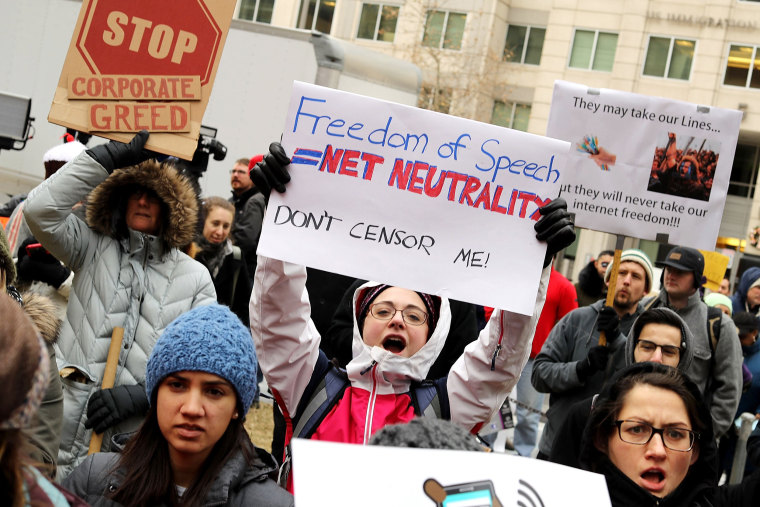The internet is an integral part of America today, and it can be a strong, positive force for protecting democratic values– if we protect people’s access to it. Net neutrality does that by ensuring that internet service providers treat all network traffic equally, not slowing or speeding up, or charging more or less for, any particular sites, channels, or content.
Without net neutrality provisions, internet service providers could take away the ability for the average American to choose how to browse the internet by blocking or slowing down websites owned by competitors. Imagine Spectrum (formerly known as Time Warner Cable) artificially slowing internet speeds when you watch Netflix as a way to pressure you to buy a cable package instead.
Net neutrality is also especially important in context of the fight against “fake news” and media manipulation. The internet is a key source of news for millions of Americans, both through traditional and new media. The internet is also, unfortunately, where one can find “fake news” — the false or fabricated content used to manipulate people through disinformation campaigns which can prevent the public from making informed political decisions. With the rising importance of the internet in all our lives, it is likely that there will be even more disinformation efforts in the future.
Net neutrality can't solve this problem, but free and open access to information can help in the fight against media manipulation for two reasons. First, net neutrality provides a regulatory safeguard against any single ISP waging a campaign to manipulate the public, push political viewpoints or prevent customers from accessing information in opposition to the company’s position. Without net neutrality rules, an ISP like Comcast (the parent company of NBC) could, for example, slow down access to the Fox News website and speed up streaming on MSNBC. This would take away from Americans their ability to choose which content to access and which kinds of information they wish to learn without artificial impediments.
The second reason why net neutrality can help fight fake news is simply that open access to the internet fosters an environment in which individuals can to access more information and gain more knowledge. As Supreme Court Justice Louis Brandeis once said, “If there be time to expose through discussion the falsehood and fallacies, to avert the evil by the processes of education, the remedy to be applied is more speech, not enforced silence.” To put it another way: The solution for bad speech is more good speech, and the solution to fake news is more real news. Net neutrality ensures that everyone can access more real news to drown out fake news and freely access the platforms through they wish to use to communicate their views with others and to learn from people, both within and outside of their existing communities.
Net neutrality is, therefore, especially important for rural and underserved populations because in many rural areas, internet access is still inadequate for modern needs and disproportionately expensive. If ISPs then charged even more for accessing certain sites or slowed down access to various online services, rural and underserved populations would be disproportionately affected and possibly not able to afford full internet access at all.
Access to the internet is especially crucial for education, which can lead entire families out of poverty: Students rely on the internet to conduct research and complete class assignments, and people of all ages use the internet to learn about things and people outside of their own experiences But people from low income communities, who might not be able to afford expensive classes, will be particularly ill-served without net neutrality.
This should be a non-partisan issue: Though Republicans and Libertarians generally lean toward deregulation, most people on both sides of the aisle agree that some basic government support is helpful to maintain the foundational structures of a nation. It is impossible to have a strong, functioning democracy without an informed citizenry that is free to make independent political choices. What’s really at stake in the fight to save net neutrality is the personal freedom of individuals to choose how to access information and how to engage in our democracy.
This is why it matters that, today, the U.S. Senate voted to reverse the Federal Communication Commission’s decision to “roll back” Obama-era net neutrality rules. This resolution still has to pass the House and receive final executive approval, but it's a positive sign for the future. The fight for net neutrality is a fight for democracy, and for the right to choose what we read, what we watch, and how we engage with a democratic culture.
Tiffany Li is an attorney and resident fellow at Yale Law School's Information Society Project. She is the Director of the Wikimedia/Yale Law School Initiative on Intermediaries and Information. Follow her on Twitter: @tiffanycli.

